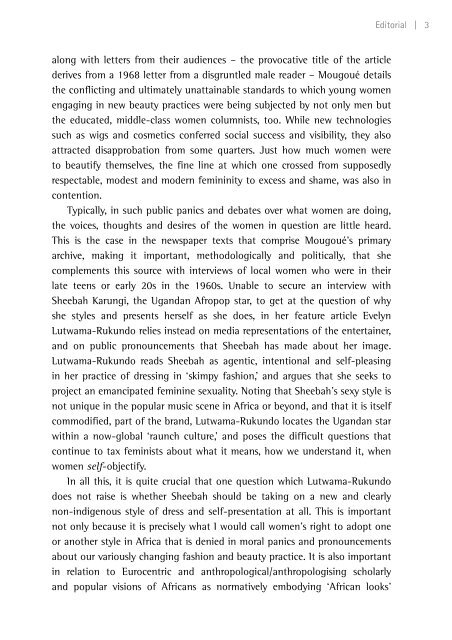The politics of fashion and beauty in Africa
fa21_proof_3
fa21_proof_3
You also want an ePaper? Increase the reach of your titles
YUMPU automatically turns print PDFs into web optimized ePapers that Google loves.
along with letters from their audiences – the provocative title <strong>of</strong> the article<br />
derives from a 1968 letter from a disgruntled male reader – Mougoué details<br />
the conflict<strong>in</strong>g <strong>and</strong> ultimately unatta<strong>in</strong>able st<strong>and</strong>ards to which young women<br />
engag<strong>in</strong>g <strong>in</strong> new <strong>beauty</strong> practices were be<strong>in</strong>g subjected by not only men but<br />
the educated, middle-class women columnists, too. While new technologies<br />
such as wigs <strong>and</strong> cosmetics conferred social success <strong>and</strong> visibility, they also<br />
attracted disapprobation from some quarters. Just how much women were<br />
to beautify themselves, the f<strong>in</strong>e l<strong>in</strong>e at which one crossed from supposedly<br />
respectable, modest <strong>and</strong> modern fem<strong>in</strong><strong>in</strong>ity to excess <strong>and</strong> shame, was also <strong>in</strong><br />
contention.<br />
Typically, <strong>in</strong> such public panics <strong>and</strong> debates over what women are do<strong>in</strong>g,<br />
the voices, thoughts <strong>and</strong> desires <strong>of</strong> the women <strong>in</strong> question are little heard.<br />
This is the case <strong>in</strong> the newspaper texts that comprise Mougoué’s primary<br />
archive, mak<strong>in</strong>g it important, methodologically <strong>and</strong> politically, that she<br />
complements this source with <strong>in</strong>terviews <strong>of</strong> local women who were <strong>in</strong> their<br />
late teens or early 20s <strong>in</strong> the 1960s. Unable to secure an <strong>in</strong>terview with<br />
Sheebah Karungi, the Ug<strong>and</strong>an Afropop star, to get at the question <strong>of</strong> why<br />
she styles <strong>and</strong> presents herself as she does, <strong>in</strong> her feature article Evelyn<br />
Lutwama-Rukundo relies <strong>in</strong>stead on media representations <strong>of</strong> the enterta<strong>in</strong>er,<br />
<strong>and</strong> on public pronouncements that Sheebah has made about her image.<br />
Lutwama-Rukundo reads Sheebah as agentic, <strong>in</strong>tentional <strong>and</strong> self-pleas<strong>in</strong>g<br />
<strong>in</strong> her practice <strong>of</strong> dress<strong>in</strong>g <strong>in</strong> ‘skimpy <strong>fashion</strong>,’ <strong>and</strong> argues that she seeks to<br />
project an emancipated fem<strong>in</strong><strong>in</strong>e sexuality. Not<strong>in</strong>g that Sheebah’s sexy style is<br />
not unique <strong>in</strong> the popular music scene <strong>in</strong> <strong>Africa</strong> or beyond, <strong>and</strong> that it is itself<br />
commodified, part <strong>of</strong> the br<strong>and</strong>, Lutwama-Rukundo locates the Ug<strong>and</strong>an star<br />
with<strong>in</strong> a now-global ‘raunch culture,’ <strong>and</strong> poses the difficult questions that<br />
cont<strong>in</strong>ue to tax fem<strong>in</strong>ists about what it means, how we underst<strong>and</strong> it, when<br />
women self-objectify.<br />
In all this, it is quite crucial that one question which Lutwama-Rukundo<br />
does not raise is whether Sheebah should be tak<strong>in</strong>g on a new <strong>and</strong> clearly<br />
non-<strong>in</strong>digenous style <strong>of</strong> dress <strong>and</strong> self-presentation at all. This is important<br />
not only because it is precisely what I would call women’s right to adopt one<br />
or another style <strong>in</strong> <strong>Africa</strong> that is denied <strong>in</strong> moral panics <strong>and</strong> pronouncements<br />
about our variously chang<strong>in</strong>g <strong>fashion</strong> <strong>and</strong> <strong>beauty</strong> practice. It is also important<br />
<strong>in</strong> relation to Eurocentric <strong>and</strong> anthropological/anthropologis<strong>in</strong>g scholarly<br />
<strong>and</strong> popular visions <strong>of</strong> <strong>Africa</strong>ns as normatively embody<strong>in</strong>g ‘<strong>Africa</strong>n looks’<br />
Editorial | 3



